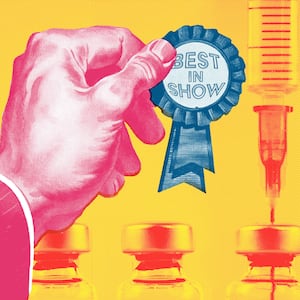Joan Marie Flaherty turned 21 in July, but before that the NYU theater student used a fake ID to get into bars around the city. There was just one problem in the waning days of her underage years: venues in the city began requiring proof of vaccination for entry. Flaherty’s vaccine card was real—she got the shot as soon as she became eligible—but her birthday on the document did not match her fake, which said she was a 25-year-old from Maine.
“It was something I was always on edge about,” Flaherty told The Daily Beast. Once she and some friends, who already turned 21, tried to get into Club Cumming, a queer bar and cabaret club owned by the actor Alan Cumming. She went to the bouncer, who asked everyone for their IDs and proof of vaccine.
“I very confidently pulled out my paper vaccine card and fake ID, and he’s looking at both of them, and I realize that my birthday is in fact not October 15, 1996,” Flaherty said. “I was like, ‘I’m so sorry, I forgot that I’m actually underage. I can’t go in, but can I get those back?’ He looked at the cards again and was like, ‘Yeah this is fake, come back in a few weeks though.’” (Flaherty was not far from her 21st birthday at the time.) She later made a TikTok describing the incident.
In New York and San Francisco, where indoor businesses like bars, restaurants, clubs, and gyms must check for vaccination to allow patrons to enter, venue owners can be fined for infractions. (Los Angeles County delayed voting for a similar ordinance on Wednesday, postponing the proposed requirement for another week.) And many young people are in favor of the rules—they’re just annoyed at the major inconvenience getting in their way of drinking. So they’re getting creative.
One bouncer at a Brooklyn music venue who spoke on the condition of anonymity said that “I see so much elaborate nonsense when it comes to this.”
“Kids will come up saying their phones are dead and they left their wallets, or show an ID that’s obviously not them and then show a COVID card where neither their names or ages match,” he said. “Of course I turn them away, and I politely tell them I am aware of what they’re trying to do.”
Overall, the bouncer said that the vaccine requirements make him take checking IDs “more seriously” than he has in the past. “I would definitely say bouncers care more about it,” he said. “You need two forms of identification now, period.”
Flaherty also works as a host at a cocktail bar in the West Village and in the last few months she’s picked up another responsibility at the door: vaccine bouncer. While the place she works is more upscale—not the type of place college-age kids would go to get drunk—she has seen some underage patrons try to slip by using a clearly doctored vaccine pass.
“Some girl showed me a vax card with a Twitter sticker put over her birthday,” Flaherty said. “She just flashed it at me and walked away. I was like, huh, you’re probably under 21. I think less people are faking their vaccines—I presume most people in New York are vaccinated—but they’re faking their birthdays because they’re under 21.”
Flaherty admits it would be hard for her to tell the difference between a well-done fake vaccine card and a real one. “I wouldn’t necessarily know if someone used a photoshopped card,” she said. “Someone could have printed out the template for the official card and filled it out themselves, but that’s so much work just to sit inside a restaurant.”
It’s fairly easy to find a blank version of the CDC’s official vaccination record card, print it out, and fill it in. The FBI issued a warning for potential forgers in August: misusing the official seal of the CDC, or any US agency, could cost you a $5,000 fine or five years in prison.
Of course this bulletin was intended to deter anti-vaxxers who have no intention of getting the shot in the first place. Some might believe there’s a big moral difference between people willingly putting others at risk, and underage drinkers who got the jab but just need a piece of paper to match their ID.
Then there are penalties for serving underage patrons. According to the New York State Liquor Authority, bar owners can be subject to penalties like fines or losing their liquor licenses. The New York State DMV has issued a scanner dubbed Operation Prevent that checks IDs for validity using various light tests; usually fakes are confiscated by bartenders.
Sometimes, there are legal consequences too. A DMV spokesperson told Spectrum News this year that first-time offenders might lose their driver’s license for up to a year. Repeat offenders can get charged with a felony. The same goes for people who use real IDs of other people (not fake IDs they bought from a company), as that is considered a type of identity theft.
“On Pride, I wanted to go to an event where you had to be 21 and show a vax card,” Flaherty added. “I was scheming with my friend: what if he asks for a vax card and I can’t show my card, but I open up my NYU student health portal to show that I have been vaccinated? Ultimately, I ended up not going.”
For now, the plight of the underage drinker is a bicoastal problem; only cities in New York and California have implemented such measures. Teens in other states will be happy to report it’s business-as-usual trying to get into bars with just one doctored form of ID.
@bridgeromlidd um wtf do we do. HELP #foryou #fyp ♬ I had a young hot thang - gabbi <3
One underage woman who lives in Atlanta said that bars around her never check for vaccine cards, and even during a recent trip to New York she was able to find venues who (illegally) didn’t check for her age at the door. It was just a matter of searching for those places.
On TikTok, the struggle is real: multiple videos of kids bemoaning the fact that their fakes are useless have gone viral. “I didn’t even think of this until now,” a caption on one video that had been liked nearly 160,000 times read. “Um... Everyone who has fake IDs has to show their vaccination card at the entrance of a bar of club...but the vaccination card has our real birthdays on it..so we have to order FAKE vaccine cards now.”
People posted tips in the comment section. “If you put it in apple wallet it doesn’t show ur birthday j[ust] ur name and the date of doses,” one person helpfully shared. “Or you can just edit in,” another suggested. “Photoshop baby.”
Or, as a commenter put it: “Not when you live in the south and they don’t believe in covid.”







